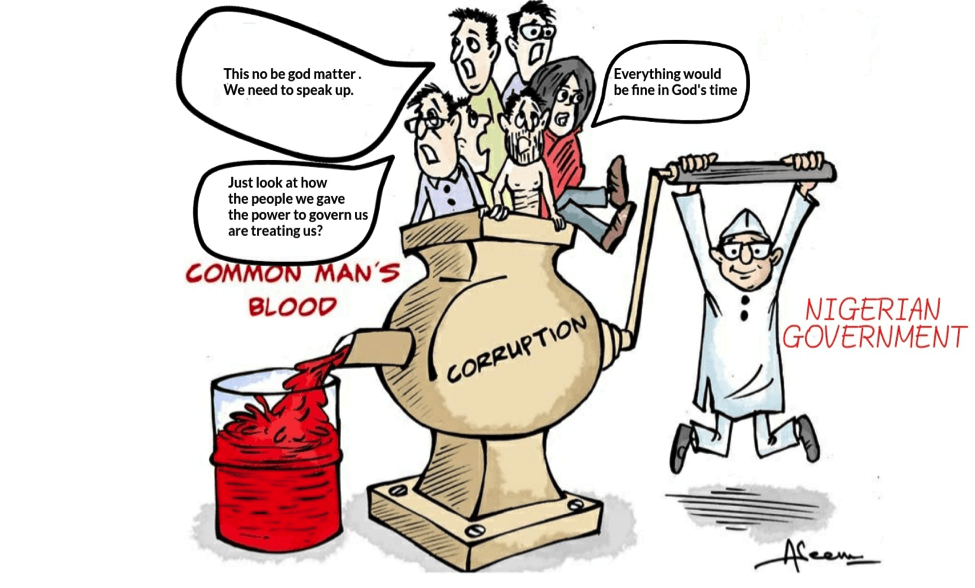
It is high time Nigerians woke up from their slumber, rise above religious sentiments and get to work… Nigerians ought to develop the habit and imbibe the culture of speaking up and asking questions as well as demanding information related to governance and public development.
According to Thomas Jefferson, “In a democracy, the highest office is the office of the citizen”. If that is the case, then citizens have a very big role to play in order to bring about the desired and required change in Nigeria.
It is unarguable that Nigeria, irrespective of what is obtainable today, is a great and mighty country. But then what makes Nigeria great? Nigeria is great because of the people inhibiting its geographical space known as NIGERIANS. It can be said, based on good authority, that indeed Nigerians are the strongest and most enduring people in the world. This, some might see as our greatest strengths, unfortunately these traits are also our greatest weaknesses. These traits which are supposed to be to the advantage of the nation as a whole has in turn become ‘curses’ inhibiting the development of the greatest African country.
Nigerians, over time, have developed a very poor and lackadaisical attitude to events occuring in the country, such that questioning the accountability of the utilisation of public funds depends on whether one is a direct beneficiary of these or not. The same attitude has, over time, influenced and made citizens to overly depend on Civil Society Organisations (CSOs) and Non-Governmental Organisations (NGOs), which they often perceive as groups questioning the activities of politicians and government officials.
Now comes the big question: Are individual citizens doing their own bit? Or could it be that they are reluctant, too busy or under the guise of religious behavioural expectations, simply “Keeping shut and praying”? No wonder Karl Marx said that ‘religion is the opium of the people’. Nigerians spend time and exert energy ‘praying’ and ‘binding’ what only requires critical thinking and proper planning.
…it is evident that even the change that Nigerians seek so much would be unattainable if all they do is to sit back and point fingers at public office holders without participating in the political processes and performing their civic duties and obligations as citizens.
It is typical of Nigerians to complain that the government is not working; that public funds are not judiciously utilised; that public office holders do not fulfil their campaign promises, etc. Nevertheless, how well have Nigerians, as patriotic citizens, managed to diligently and efficiently use the few basic infrastructure that have been put in place, for good? Rather what we hear are comments like ‘na government money’ or ‘na government property’ or ‘I no be government pikin’, as they carelessly misuse these public goods, such as public toilets, schools, hospitals, roads, pipe borne water etc.
According to Albert Einstein, it is only a fool that keeps “doing the same thing over and over again and expects a different result” each time. Going by this, it is evident that even the change that Nigerians seek so much would be unattainable if all they do is to sit back and point fingers at public office holders without participating in the political processes and performing their civic duties and obligations as citizens.
We long for an era in which Nigerians think and ask intelligent and critical questions, while demanding for accountability and transparency from the system that is working on their behalf. It is high time Nigerians began to utilise the available tools at their disposal in demanding for their rights. Six years after the passage of the Freedom of Information Act (FOIA) 2011, how well have Nigerians used and applied it? What about the Fiscal Responsibility Act, 2001?
…according to de Mello, what you are aware of, you are in control of; what you are not aware of, is in control of you. You are always a slave to what you are not aware of. So now that Nigerians are aware, it’s time to take control.
Recent visits by procurement monitors from the Public and Private Development Centre (PPDC) to various project sites, have brought to limelight, how funds released for Primary Health Centres (PHCs) in some selected states have been managed. These visits were facilitated through procurement data received through FOI requests procurement monitors sent out, and the data collected were systematically fed into our online platform ‘BUDESHI’, which links budget data and procurement records to the eventual service delivery.
It is high time Nigerians woke up from their slumber, rise above religious sentiments and get to work because ‘Laborare est orare’ (to work is to pray). Nigerians ought to develop the habit and imbibe the culture of speaking up and asking questions as well as demanding information related to governance and public development.
Conclusively, according to de Mello, what you are aware of, you are in control of; what you are not aware of, is in control of you. You are always a slave to what you are not aware of. So now that Nigerians are aware, it’s time to take control.
Onyekachi Chukwu is an intern at the Public and Private Development Centre (PPDC); Twitter: @Kachichukwu, while Ifeoma Onyebuchi is a Programme Officer with PPDC; Twitter: @onyebuch4.
END

Be the first to comment